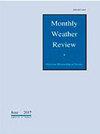浅水方程的CFL优化正反向龙格-库塔格式
IF 3
3区 地球科学
Q3 METEOROLOGY & ATMOSPHERIC SCIENCES
引用次数: 0
摘要
摘要提出了求解浅水方程的龙格-库塔型时间步进格式的公式并对其进行了优化,目的是大幅度提高求解浅水方程的有效允许时间步长。该方案称为FB-RK(3,2),使用厚度数据的加权前向后平均来推进动量方程。这种平均的权重是通过采用冯·诺伊曼式分析的优化过程来选择的,以确保权重最大化可接受的科朗数。通过简化的局部截断误差分析和数值实验,我们证明了该方法对于任何权重的选择都至少是二阶的,并且对于良好分辨的波具有较低的色散和耗散误差。此外,我们表明,在准线性测试用例中,优化的FB-RK(3,2)的时间步长是流行的三阶段,三阶强稳定保持龙格-库塔方法的2.8倍。在与海洋和大气流动相关的完全非线性浅水测试用例中,FB-RK(3,2)在可接受的时间步长上优于SSPRK3的因子大约在1.6和2.2之间,使该方案的计算效率提高了约两倍,而对溶液质量几乎没有影响。本文章由计算机程序翻译,如有差异,请以英文原文为准。
CFL Optimized Forward-Backward Runge-Kutta Schemes for the Shallow Water Equations
Abstract We present the formulation and optimization of a Runge-Kutta-type time-stepping scheme for solving the shallow water equations, aimed at substantially increasing the effective allowable time-step over that of comparable methods. This scheme, called FB-RK(3,2), uses weighted forward-backward averaging of thickness data to advance the momentum equation. The weights for this averaging are chosen with an optimization process that employs a von Neumann-type analysis, ensuring that the weights maximize the admittable Courant number. Through a simplified local truncation error analysis and numerical experiments, we show that the method is at least second order in time for any choice of weights and exhibits low dispersion and dissipation errors for well-resolved waves. Further, we show that an optimized FB-RK(3,2) can take time-steps up to 2.8 times as large as a popular three-stage, third-order strong stability preserving Runge-Kutta method in a quasi-linear test case. In fully nonlinear shallow water test cases relevant to oceanic and atmospheric flows, FB-RK(3,2) outperforms SSPRK3 in admittable time-step by factors roughly between 1.6 and 2.2, making the scheme approximately twice as computationally efficient with little to no effect on solution quality.
求助全文
通过发布文献求助,成功后即可免费获取论文全文。
去求助
来源期刊

Monthly Weather Review
地学-气象与大气科学
CiteScore
6.40
自引率
12.50%
发文量
186
审稿时长
3-6 weeks
期刊介绍:
Monthly Weather Review (MWR) (ISSN: 0027-0644; eISSN: 1520-0493) publishes research relevant to the analysis and prediction of observed atmospheric circulations and physics, including technique development, data assimilation, model validation, and relevant case studies. This research includes numerical and data assimilation techniques that apply to the atmosphere and/or ocean environments. MWR also addresses phenomena having seasonal and subseasonal time scales.
 求助内容:
求助内容: 应助结果提醒方式:
应助结果提醒方式:


